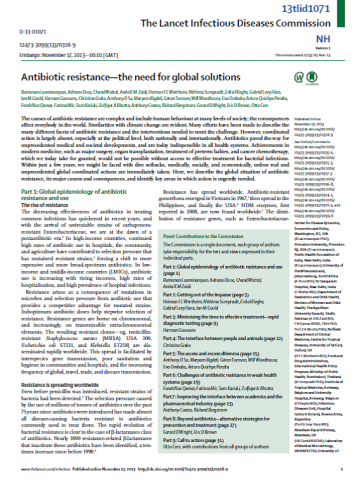
DCP3 series editor and director of the Center for Disease Dynamics, Economics, and Policy (CDDEP), Ramanan Laxminarayan, co-authored a recent Lancet Infectious Diseases Commission report entitled "Antibiotic resistance - the need for global solutions", that addresses the threat of antibiotic resistance. The report was prepared by a 26-member Commission, convened by the Journal to galvanize attention to the serious threat of antibiotic resistance, and propose viable solutions. Dr. Laxminarayan served as lead author for the report's opening segment on the overall burden of global resistance, which demonstrates that low-and middle-income countries are experiencing the greatest threat from resistance.
DCP3 volume 2 author Zulfiqar Bhutta served as a member of the commission and report co-author.
Executive Summary
The causes of antibiotic resistance are complex and include human behavior at many levels of society; the consequences affect everybody in the world. Similarities with climate change are evident. Many efforts have been made to describe the many different facets of antibiotic resistance and the interventions needed to meet the challenge. However, coordinated action is largely absent, especially at the political level, both nationally and internationally.
Antibiotics paved the way for unprecedented medical and societal developments, and are today indispensable in all health systems. Achievements in modern medicine, such as major surgery, organ transplantation, treatment of preterm babies, and cancer chemotherapy, which we today take for granted, would not be possible without access to effective treatment for bacterial infections. Within just a few years, we might be faced with dire setbacks, medically, socially, and economically, unless real and unprecedented global coordinated actions are immediately taken. This Commission describes the global situation of antibiotic resistance, its major causes and consequences, and identify key areas in which action is urgently needed.
Call to Action
In the final section of the report, author Otto Cars of Uppsala University presents a compelling list of seven action items and long-term goals for addressing the imminent crisis of antibiotic resistance:
- Measuring the extent of the problem and its consequences
- Regulation, rational use, and infection control in human medicine
- The need for rapid diagnostics
- The animal sector and the environment
- New antibiotics and alternative strategies
- Governmental coordination and action
- Global convergence
Professor Cars writes, "Only now has the awareness and urgency of the problem of antibiotic resistance reached a level that a new sustainable global system to counteract these problems can be built. Addressing these problems will require nothing less than a fundamental shift in how antibiotics are developed, financed, and prescribed."
In a Lancet press release, Cars and the Commission urge all stakeholders to take responsibility for the problem and move toward concrete action together.
Additional Resources



